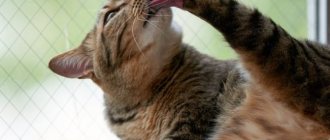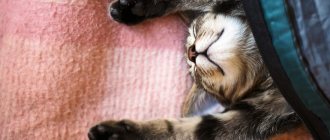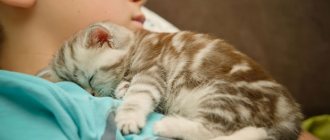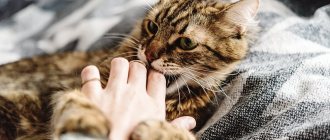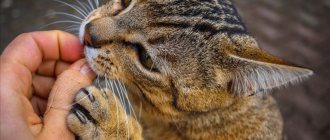Why is the cat licking me?
Experts identify such a model of behavior as mutual grooming. When there are several cats in the house, and they live among themselves in peace and harmony, you can watch how they lovingly lick each other. In some cases, purrs begin to lick their owners. This is also a sign of friendship and goodwill. The cat shows that you both are one family, together you are one. By the way, interesting results were recently published. It turns out that the mustaches are sincerely happy to be reunited with their owners after a long separation, and express their wild joy in many ways - including those that had never been seen before.
Why cats start biting their owner
If the cat first licked the owner and then began to bite, then there are several reasons for this. It turns out that cats can bite people in different ways. Moreover, what information she wants to convey to her owner depends on this. The most common cases when a cat licks first and then bites are:
- if the pet first licked the hand and then squeezed it with its teeth, this is a way of showing cat love. Cats bite each other in the same way. If a cat is hurt in this way, then there is no need to chase it away, it is better to stroke it or switch its attention to something else;
- If the cat bit into your hand and even let out its claws, then it really didn’t like something. It is possible that you somehow stroked her incorrectly. In this case, the cat must be left alone.
Often a bite is assessed as a declaration of love. It also happens that cats bite their owners so badly that they even have to seek medical help.
Bites and then licks. What does this mean?
Experts give a slightly unexpected answer. Bite and then lick - all this indicates that your pet sees you as an equal. That is, he treats you like another cat. An approximate translation is: “You are my friend (or girlfriend), and between friends anything is possible. A moment of irritation, a disagreement, and then peace and friendship forever.”
Another option is also possible. The purr is simply demonstrating a pattern of behavior that it often practices. See how your pet behaves if it finds something hard and stuck in its fur while washing. He will first gnaw, remove the “foreign body”, and then begin to lick this area. And this behavior model is transferred to the owner without any deep subtext.
Aggression caused by affection
Petting aggression is different from petting behavior - some cats simply don't like to be petted and can seriously hurt you if you try to pet them. On the other hand, a cat that exhibits petting-induced aggression will seek affection, submission, and then inexplicably and without warning turn into the Hulk.
There are several theories about why some cats may do this. In fact, the cat may be trying to control the situation. The ancestor of the modern domestic cat was probably a solitary animal, so the whole social hierarchy is still fairly new to it. Your cat may reach a boiling point in that moment of shared affection where she thinks, "I can't let this person think I'm actually domesticated or something, I'd rather just bite him."
Russian classics of literature do not give up their positions in the digital world
My best friend: Galina Yudashkina tenderly congratulated her husband on his birthday
Chocolate Banana Cake: a recipe for an unusual dessert without baking
This may not explain all the aggression caused by affection, but still. Another theory is that some cats may actually perceive prolonged petting negatively, and biting is a reaction to this. It may be that petting the fur actually begins to irritate your cat physically. So maybe you're literally just petting the cat wrong.
How to evaluate such behavior?
In some cases, through a bite, cats demonstrate to their owners that they are sick or experiencing significant discomfort. Whiskers often lick, in particular, painful or damaged areas of the body. When the owner accidentally touches a sensitive area, the pet may bite.
As for biting and licking at the same time, experts are quite optimistic. Some minke whales, while carefully licking loved ones, themselves receive incredible pleasure from the process. When a cat is in pain, she usually hides her ailments from strangers until the last moment. But an attentive owner will still notice something is wrong based on a number of other accompanying signs. And at the slightest suspicion of a disease, it is better to show your pet to a veterinarian. It's much more reliable this way.
Original Post : Why Does My Cat Bite Me And Then Lick Me? Author : Reyna Abraham. Source: cuteness.com Photo: pixabay.com
The cat may just be excited
Biting can also happen when the cat gets excited and decides that the petting session should turn into play time. After all, cats are predators, and they hone their hunting skills by beating up toys, ambushing your legs when you go to the bathroom late at night, and perhaps biting you while you're trying to show affection. So if your weasel leans a little on the aggressive side, your cat might just react to that in a completely natural way.
One of the latest theories is that the sudden switch between affection and bloodlust may not happen without warning. There may be subtle signs that a cat is no longer enjoying the interaction, but these can be so subtle that some owners simply don't notice them until it's too late.
Types of cat bites
First, you need to decide on the terminology, and only then figure out what to do if the cat bites.
Cats bite when petted in different ways:
- soft, gentle biting that does not cause harm or obvious discomfort, without the involvement of claws, is rare. This is usually how cats communicate with their kittens. If your hand becomes the object, it means you have been admitted into the holy of holies and accepted not just into a family, but deep into your heart;
- aggression on the part of the cat, when he tries to attack, scratch, becomes uncontrollable, makes you think about possible problems. Especially if this happens immediately after a normal and familiar life situation. But the cat was lying there, and you were petting him, and then suddenly the disposition changed and he turned into a real little devil: he began to bite and scratch.
Then it is really important to understand why the cat bites, so that the unpleasant situation does not repeat itself in the future.
How to stop a cat from biting
To prevent bites, you need to monitor your cat's body signals, which always precede an attack. Her ears are flattened, she beats her tail and meows threateningly - the animal is irritated, you need to leave him alone. You can check whether the cat is in the mood for affection by extending your hand to her. If the pet sniffs and rubs against her - he doesn’t mind, does not react or deviates - the moment is not chosen. The cat should not be petted when it is scared, eating or visiting the litter box. She will perceive affection after punishment for an offense as encouragement. You should not touch an animal in a dream - it may perceive this as a violation of personal space. Before petting your pet, you can play active games with him - this will help him lose excess energy and negative emotions.
LiveInternetLiveInternet
It is very difficult to explain the behavior of cats; many do not understand why they first lick a person and then bite them. At first it seems that the cat is showing its affection, and then for some reason it shows aggression. There is an explanation for this.
Why do cats lick their owner?
Experts identify a pattern of behavior in cats called grooming. In a house where many cats live, you may notice them licking each other. In some cases, pets begin to lick their owners, this serves as a sign of goodwill and friendship. Thus, the cat shows that you are one family, one whole.
Studies have shown that cats are happy to meet their owner after a long separation, so they express their joy in different ways. One of them is licking.
There are several reasons why cats do this:
- show attention. In this way they try to express their love and make it clear that the owner is important to them;
- marking territory. Most often, cats lick each other when they themselves cannot reach some area. This is first and foremost a sign of friendship. When a pet begins to lick its owner, this is a kind of territory marking. By licking a person, cats leave their scent, showing their belonging;
- play. Sometimes, during the game, a cat begins to first lick a person and then bite. You shouldn’t worry or scold the animal, because it shows that it’s having fun and that the pet wants to continue playing;
- relieves stress. If a cat licks itself all the time, then most likely it has suffered stress. In this case, the pet needs to be given attention, hugged and stroked.
Those who are not spoiled by their pet's licking and biting should not despair and think that the animal does not love them. There are many different ways your pet can show affection, so pay attention to his other actions.
Why do cats start biting their owner? If a cat first licked its owner and then started biting, there are several reasons for this. It turns out that cats can bite people in different ways. Moreover, what information she wants to convey to her owner depends on this. The most common cases when a cat licks first and then bites are:
- if the pet first licked the hand and then squeezed it with its teeth, this is a way of showing cat love. Cats bite each other in the same way. If a cat is hurt in this way, then there is no need to chase it away, it is better to stroke it or switch its attention to something else;
- If the cat bit into your hand and even let out its claws, then it really didn’t like something. It is possible that you somehow stroked her incorrectly. In this case, the cat must be left alone.
Often a bite is assessed as a declaration of love. It also happens that cats bite their owners so badly that they even have to seek medical help.
What does it mean if a cat first bites and then starts licking?
Experts give an unexpected answer to this question. It is believed that if an animal first bites and then licks a person, then it sees in him an equal to itself, and therefore treats it as it treats another cat. This is how cats show their behavior patterns.
There are cases when cats try to prove to their owner with their bite that they are sick or feel some kind of discomfort. Pets often lick damaged or diseased areas of their body. If a person touches this area, the animal may bite him.
Some cats, when licking their loved ones, themselves get great pleasure from this process. When an animal feels pain, it tries to hide it from strangers. Only an attentive owner will be able to notice that something wrong is happening to his pet. In case of the slightest suspicion, the animal must be shown to a veterinarian.
How to wean yourself from a bad habit
Many owners of furry aggressors are trying to solve the question of why a cat bites just like that. Experienced breeders and animal psychologists believe that there is always a very specific reason behind aggressive behavior. By identifying the motive that prompts aggression, you can correct the behavior of your domestic cat. Experts recommend the following ways to get rid of a bad habit:
- Young kittens should be accustomed to the presence of humans as early as possible. Babies need to be held, stroked, caressed. Under no circumstances should you tease a kitten with your hands or use them as an object to play with. The baby should only play with teasers, toys and other devices.
- A visit to the veterinarian will help rule out disease as the reason why the cat bites.
- Under no circumstances should you punish a cat for bites inflicted during play. Any opposition will cause the pet to become even more aggressive. The best thing to do is to remove your hand and stop communicating with the cat for a while. The animal can also be distracted, for example, by offering to play with a toy.
- Instead of physical punishment, you can influence your pet psychologically: grab it by the scruff of the neck and hold it suspended for a few seconds. This will remind the aggressor of the lessons of the cat mother.
Patience, knowledge of your pet’s psychology and consistency in actions will help you wean yourself off the bad habit, and communication with your animal will be pleasant and safe.
We recommend reading about how to stop a cat from biting. You will learn about the causes of bites and scratches, methods for correcting bad behavior, and useful tips. And here is more information about how to punish a mischievous cat.
Causes of bites
Experienced breeders know that a healthy and well-trained animal will never show aggression towards a person out of the blue. Inappropriate behavior of a pet is usually associated with health problems, disorders of psycho-emotional development, as well as errors made during upbringing.
| Reasons why a cat bites when you pet him | Rationale |
| Negative past experiences | Sometimes an animal is lured by affection into procedures that are unpleasant for it: bathing, claw trimming, injections, etc. It is enough to deceive your pet several times in such a treacherous manner from the cat’s point of view - and trust will be lost forever. Subsequently, the display of affection and attention from members of the household will be regarded by the animal as a manifestation of violent actions towards it. Of course, the response will be biting and scratching. |
| Early weaning of a kitten from its mother | A mother cat, as a rule, teaches the baby that a person is a source of food, warmth and does not pose a threat. If weaned early, the kitten does not have the appropriate experience of communicating with people; a large creature causes fear in it and, as a result, aggression. The owner’s hands frighten the mature animal and, defending itself from an imaginary danger, the adult cat displays self-defense when they try to pet it, scratches and bites. Animals born outside in the wild behave the same way. A person is perceived by street cats as a hostile object, from which they can use claws and teeth to defend themselves. |
| Pregnancy or breastfeeding period | The reason is quite understandable - an instinctive desire to protect future offspring. Many owners notice that a pet's pregnancy dramatically changes its character, and some cats become unfriendly and wild. |
| Pain | Unpleasant sensations and pain cause attacks of aggression in the animal. Cats react especially sharply when stroking their bellies in the event of the development of diseases of the internal organs. Diseased kidneys may be the reason why a cat does not allow itself to be stroked on its lower back. Inflammatory phenomena on the skin, damage, wounds and scratches are a common reason why a cat bites hands when stroking. |
| Perception of affection as a game | Small kittens are most often mischievous due to the fact that they perceive affection and attention from humans as a game. As soon as household members start playing with the baby using devices or toys, the problem is quickly solved. |
Among the many reasons for cat aggression, the owner must understand which factor is the trigger in a particular case.
